The Old Wives' Tale. By Arnold Bennett. (Chapman and Hall.
6s.)—Mr. Arnold Bennett takes as the subject of his new novel the separate histories of two sisters, who in the first chapters of the book are in their later teens, while the curtain does not fall till they have both died as elderly women. Constance and Sophia Baines—afterwards Constance Povey and Sophia Scales—being the daughters of a small provincial shopkeeper, it will be seen that the story is cast in no heroic mould ; and even though two of the great catastrophes of the modern world—the siege of Paris and the subsequent Commune—are included, their importance is limited to their effect on the domestic concerns of Sophia, through whose eyes they are shown to the reader. As the sisters live apart for thirty years, the book is necessarily divided into two portions. Mr. Bennett proceeds smoothly with the history of Constance until she is an elderly woman, and then goes abruptly back to the year 1866, in which he takes up the history of Sophia, who has disappeared both from the town of Bursley and from Mr. Bennett's pages so long before. It must not be con- sidered, however, that the smallness of the events of this story makes for monotony or dullness. The largeness of the events in a life is not a question of intrinsic size, but of proportion, and to some people a small domestic crisis may produce as much change and perturbation as the occurrence of an earthquake or a ship- wreck to others. Mr. Arnold Bennett does not allow his readers to be bored for one moment. He shows the small facts of Constance Povey's life just as they appear to Constance herself, and the reader will find that the course of a woman's life in Bursley for over thirty years becomes invested with increasing interest to him. Sophia Scales lives under different conditions. In 1870 her husband deserts her in Paris, and thereafter she lives there by her own exertions. Though thrown by circumstances into the midst of a disreputable world, she keeps a tight hold on her own honesty, uprightness, and conduct. With all this she is less amiable than Constance, and a more astonishing product to have come out of the town of Bursley. The other characters in the book are grouped round these two salient figures, and though they stand out from the canvas, yet do so in due subordination to the two heroines. It will be perceived by the reader that Mr. Arnold Bennett has written an exceedingly clever novel, and one which will well repay perusal. No one, however, without plenty of time before him should attempt to begin it. It is not a story to be skipped or road in a hurry, and its five hundred and seventy-eight closely printed pages should be every one of them duly and faithfully turned. If this is done, the reader will be rewarded for his perseverance, and will realise at the end that Mr. Arnold Bennett has taken a new departure in his art from which interesting developments may be expected.






































































 Previous page
Previous page